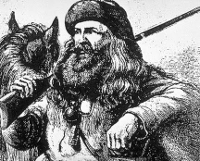The Making of the 50 States: Wyoming
Part 1: In the Beginning Among the Native American tribes who lived in what is now Wyoming were the Arapaho, Arikara, Bannock, Blackfeet, Cheyenne, Comanche, Crow, Dakota Sioux, Gros Ventre, Kiowa, Nez Perce, Pawnee, Sheepeater, Shoshone, and Ute. The first Europeans to enter the Wyoming area are thought to be Francois and Louis-Joseph Verendrye of France, in 1742. The eastern part of Montana was part of the Louisiana Territory, which the United States acquired from France in 1803. 
John Colter in 1807 was one of the earliest Americans to explore the Wyoming area. Colter, a member of the Lewis and Clark expedition, reported finding a region of steaming geysers that he found so unusual that he named it Colter's Hell. This became Yellowstone, the world's first national park, in 1872. Another pioneering explorer in Wyoming was Robert Stuart, who in 1812 discovered South Pass; the Oregon Trail later followed this route. As in other western states, the fur trade was big in Wyoming. Among the trappers and explorers who went through the area were Jim Bridger, Kit Carson, Davey Jackson, and Jedediah Smith. The discovery of gold in California in 1849 led to the California Gold Rush, and many treasure-seekers traveled through Montana on their way west. The first major cattle drive from Texas to Montana went through Wyoming along the Bozeman Trail in 1866, led by Nelson Story. To facilitate safe travel, American settlers established forts, including the famous Fort Laramie, which was also a stop on the Pony Express and the Overland Trail route. Next page > The Rest of the Story > Page 1, 2
|
|
Social Studies for Kids
copyright 2002–2026
David White




